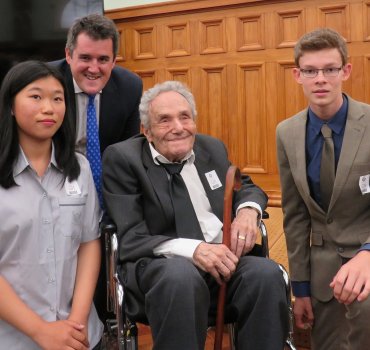

Holocaust survivor Paul Seideman with Hutt South MP Chris Bishop and this year’s winners of his competition – Anna Sue (Mt Roskill Grammar School) and Seb Bartley (Cambridge High School). Photo – Sarah Williams.
Paul Seideman was a Czech teenager in 1941 when he first suffered the horrors of the Auschwitz death camp, and later other concentration camps, during World War 2. Now approaching 90, he lives quietly at Shona McFarlane Retirement Village in Lower Hutt. His experiences, and a desire to educate NZ youth, led Paul to endow a competition for Year 10 and Year 11-13 students at secondary schools that teach the Holocaust. The 2017 winners received their prizes on 26 January at a Parliamentary reception for the commemoration of United Nations International Holocaust Remembrance Day. Sebastian (Seb) Bartley, a Year 10 pupil of Cambridge High School, won the junior section of this year’s Paul Seideman Competition, with a short documentary video with a strong message reinforcing the individuals’ responsibility to speak up when one sees the persecution of another. He was accompanied to Wellington by his parents, Ross and Lyndal Bartley of Cambridge.
Anna Sue, a senior school student from Mt Roskill Grammar School in Auckland, won the senior section with a strong essay addressed to her own cohort of teenagers: “How the Holocaust is significant to high schoolers”.
Hutt South MP Chris Bishop, who hosted the event and presented the prizes – cash, and a certificate – also spoke about his visit some years ago to a Holocaust-razed Polish village.
Seb’s video was screened and Anna read her essay to the audience at the reception which included their parents, Holocaust survivors including Paul Seideman, members of the diplomatic corps, members of Parliament, city and regional councilors, and human rights and interfaith leaders.
The annual competition is part of the Holocaust education programme run by the Wellington-based Holocaust Centre of New Zealand, dedicated to educating New Zealand society, through Holocaust history and remembrance, to oppose prejudice in all its forms, and guard against attempts to make any group a target of mass prejudice, as happened to the Jews in Europe.








